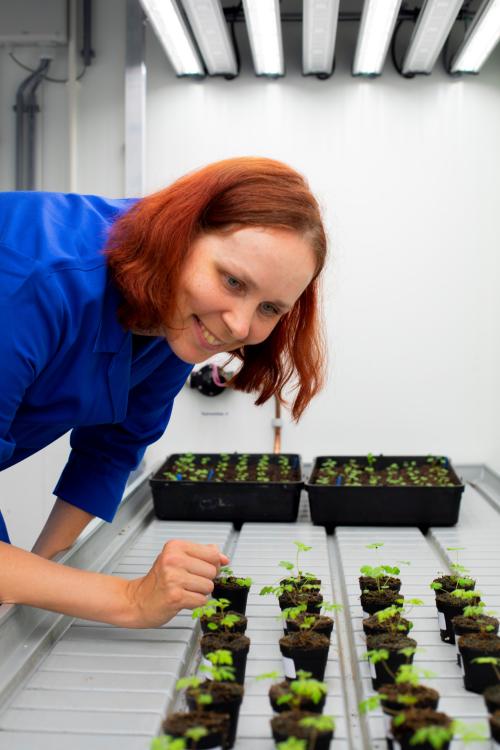The Space Between
International plant biologist creates Postdoctoral Research Symposium as Professors for the Future fellow

Being a postdoctoral scholar is frequently described as a “strange, in-between” phase of a person’s academic career.
Postdocs are in a training-focused fellowship position where they are neither a student nor a staff person. They have earned their doctorate, but still require some additional time working in a lab or conducting research before they are ready to launch their own research group. It is a necessary stepping-stone for a career in academia, but one that can feel like a state of limbo between the student and staff communities and so, often, scholars never quite feel part of either.
At UC Davis, however, there are ongoing efforts to create more opportunities for community building for postdoctoral scholars. Many of these efforts are grown from the ideas of postdoctoral scholars, such as Kaisa Kajala, a former UC Davis postdoctoral scholar who created The Postdoctoral Research Symposium as part of her time as a Professors for the Future fellow.
An idea grows
Originally from Finland and now an assistant professor of Plant Ecophysiology at Utrecht University in the Netherlands, Kajala obtained her bachelors and Ph.D. in Cambridge before coming to UC Davis in 2012 to do her postdoctoral research. She was drawn to the Aggie campus, not because of the beautiful California sunshine (although that didn’t hurt), but because of paper she read from a UC Davis researcher.
“There was this paper from this, in my opinion, stellar researcher—Professor Siobhan Brady. I read that paper and thought, ‘wow, they can do that!’ and I thought it was amazing. I when I was looking for post-doctoral positions, I saw that she was starting her own lab so I reached out to her.” Kajala said. “When I talked to her, I realized that not only is she an amazing researcher, but also an amazing person. I knew, this is the person I want to work with.”
Although the impetus for Kajala’s venture to UC Davis was one person, she soon became impressed with collaborative culture of the powerhouse research institution, especially related to her topic of interest—plants. Kajala’s research interest is focused on what each individual cell type does within a plant’s structure.
“I think when I was at UC Davis, there was 150 labs working on plant-related questions,” she said. “I mean, that is immense and not comparable to anything else in the world.”
The plant-focused research community at UC Davis was so expansive that Kajala saw a need for more opportunities for these groups to come together. She created a plant-based postdoc seminar series so students and scholars who studied plants across the numerous departments on campus could come together and discuss their research.
The Postdoctoral Research Symposium
The series was so successful that Kajala began thinking about expanding upon it to fulfill something she and other postdocs thought was needed at UC Davis—a research symposium for postdocs. At the time that Kajala was a postdoc (2012-2017), there was no outlet for postdoctoral students to present their research to the university community. She and many in the postdocs community felt this was a huge gap in their postdoctoral experience.
“As a postdoc you lack any framework for your personal or additional training,” she said. “Plus, you are not a student, but you are not a staff person either. We always talk about how we are ‘the in-between people’ and how it would be nice if we had something that could bring us all together across the different disciplines.”
Kajala met with her friends with the postdoctoral union and, after a brainstorming session “that may have included glasses of beer and wine,” the idea for The Postdoctoral Research Symposium was born.
Make the change you want to see
Kajala submitted this project idea as part of her application to the competitive, PFTF fellowship. Kajala was accepted into the PFTF program and, in 2015 as part of the yearlong fellowship, she created The Postdoctoral Research Symposium—an annual event, which is still held to date, that showcases the research and scholarly work of postdoctoral scholars.
“I came to realize that basically, if you want to see something happen, then you can do it. There’s a lot you can do at UC Davis and in PFTF if you have a vision,” she said. “And realizing that was actual possible was quite empowering.”
Kajala said this mindset has influenced the way she approaches teaching to this day.
“I think about empowerment a lot when I’m teaching now,” she said. “I am always mindful to try and empower students and show them they can to do scientific research as undergraduate.”
PFTF helps with teaching qualifications internationally
Her PFTF experience also gave Kajala some practical knowledge which she used to obtain her current faculty position and the way she launched her career in academia. Kajala used the demo lecture, which she recorded as part of her PFTF experience, as part of application package for her current faculty position. Additionally, her PFTF experience helped her fulfill teaching qualifications in the Netherlands—a process that otherwise would have required numerous, time-consuming courses and a 40-50 page document to complete.
“At PFTF, they threw us in the deep end with active learning, made us really think about how we approach teaching and how we could design courses,” she said. “When I started my job as an assistant professor, I went back to my notes from PFTF and used them to design a course. I think I was really well equipped to start teaching. I don’t know where I would have started without PFTF.”
Kajala also credits the innovative and supportive culture in Graduate Studies as having a positive impact on her postdoctoral experience.
“I really, really enjoyed my postdoc time at Davis,” she said. “Everyone at Davis is very excited and supportive if anyone has a new idea. I think that enthusiasm and that atmosphere was a great place for me to be doing my postdoc.”
